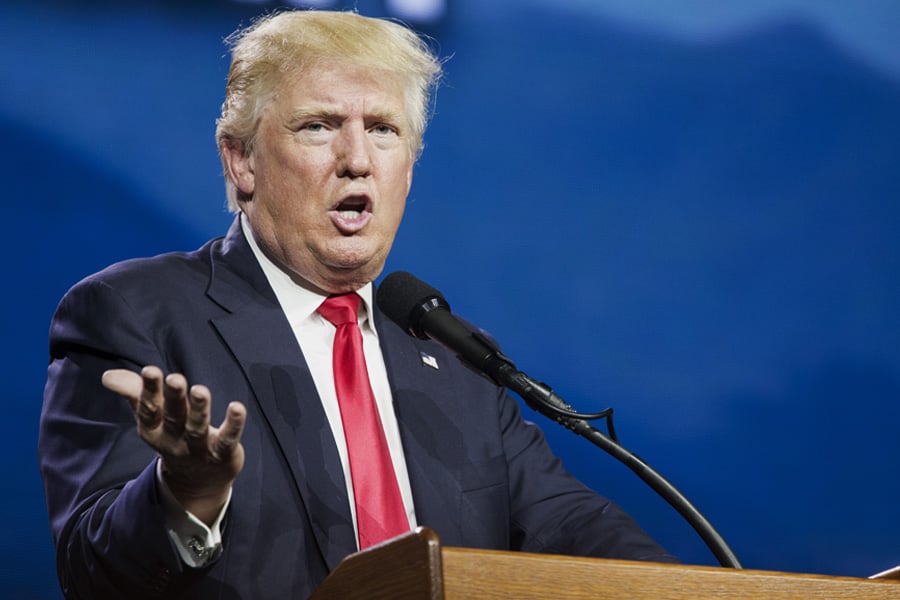If you needed a reason to give clients not to sell their stocks in a panic, here's one: The election of Donald J. Trump as president.
Partisans on both sides were warning of the dire effects of a Trump or Clinton presidency. Expectations were high for Ms. Clinton, and low for Mr. Trump.
"If we were to go in 70/30 [for Ms. Clinton], and we think the market is 10% higher under Ms. Clinton than Mr. Trump, if Ms. Clinton wins it should be up about 3% and if Mr. Trump wins, it should go down 7%," Eric Zitzewitz, economics professor at Dartmouth College, told CNBC just a few days before the election.
The upstate returns are in, and the Trump rally is impressive so far.
The Standard and Poor's 500 stock index gained 2.77% in the 13 trading days since the election and November 30, according to Howard Silverblatt, senior index analyst for S&P Dow Jones Indexes.
Some of Mr. Trump's harshest rhetoric was reserved for financial services companies. “Hillary Clinton meets in secret with international banks to plot the destruction of U.S. sovereignty in order to enrich these global financial powers, her special-interest friends and her donors,” Mr. Trump told a crowd in Miami Beach, Fla. in October.
He also routinely blasted hedge funds.
But the biggest gainers in the rally were in the financial sector, up 12.3% between Mr. Trump's upset victory and Nov. 30. The surge in financials accounted for 53.2% of the gain since Election Day, Mr. Silverblatt said — and without the rally in financials, there would have been no new high in the S&P 500. (Financial advisers cheered the thought of a rollback in the
Department of Labor's fiduciary rule).
There's still plenty of time for the stock market to fall apart, but at the moment, Mr. Trump's post-election/pre-inauguration record clobbers President Obama's record. The S&P 500 fell 19.94% from Mr. Obama's election to his inauguration. Of course, that was late 2008 and early 2009.
Since Obama's election, however, the stock market has gained 160.3% with dividends reinvested, or an average annual return of 12.62%.
Naturally, anyone who sold stocks on Nov. 9 is not happy. Those who hedged their portfolios probably aren't very happy, either.
The iPath S&P 500 VIX Short-term Futures ETN (VXX), for example, fel 13% from its election night close Nov. 8 to Nov. 30. The Vanguard Total Bond Market Index fund (VTBSX) has tumbled 2.7%.
One reason for the rally may be the slow realization on Wall Street of Mr. Trump's tendency to exaggerate. His appointment of Steven Mnuchin as Treasury secretary certainly doesn't display any antipathy to Wall Street. Mr. Mnuchin was a Goldman Sachs partner and hedge fund operator.
Another may be the potential for corporate tax cuts in the Trump administration. Mr. Mnuchin has said the Trump administration is targeting at 15% tax rate. The current official rate is 35%, and the effective rate is 29%.
“The prioritization of tax reform, inclusive of corporate tax cuts designed to improve the competitive position of U.S. corporations within the global economy, is potentially a huge plus for the equity markets since it can significantly boost earnings growth as early as 2017 and beyond,” according to S&P Investment Advisory Services.
Finally, there's the end of a constant stream of politicians complaining about how lousy the economy is.
Sharp rallies make many investors uneasy, and Wall Street has plenty of reasons to sell off between now and the inauguration. The first is probably the worst-kept secret in finance: The Federal Reserve is likely to hike short-term interest rates on December 14. The stock market rarely takes interest rate hikes well, even though this one will be an acknowledgement that the economy is growing at a decent pace.
The growing economy may be one reason why consumer confidence has surged. The University of Michigan's consumer confidence survey jumped 8.2 points in November.
“The upsurge in favorable economic prospects is not surprising given Trump's populist policy views, and it was perhaps exaggerated by what most considered a surprising victory as well as by a widespread sense of relief that the election had finally ended,” the University said in a press release.
And there's also the fact that the economy is, after all, in pretty good shape. The most recent revision of third-quarter gross domestic product showed a gain of 3.2%, vs. 1.4% in the second quarter. Unemployment is 4.6%, down from 7.8% in January 2009 and a peak of 10% in October that year.
But some observers remain wary of the recent run-up in stocks.
“When markets get too far out in front of events, it often ends badly,” said Ray Ferrara, CEO of Provise Management Group. “Even before the markets raced ahead, we felt that they were in the upper range of fair valuation.”
Sam Stovall, chief investment strategist for CFRA, agreed.
“With overly optimistic trailing and forward P/E ratios, a digestion of recent gains is becoming increasingly anticipated,” he wrote to clients at the end of November.
But history suggests that the end of the rally won't happen this month.
“During the Nov. 30 through Dec. 15 period, however, the S&P 500 has risen in price 60% of the time, not implying a high probability of an upcoming mid-December selloff,” Mr. Stovall wrote.







